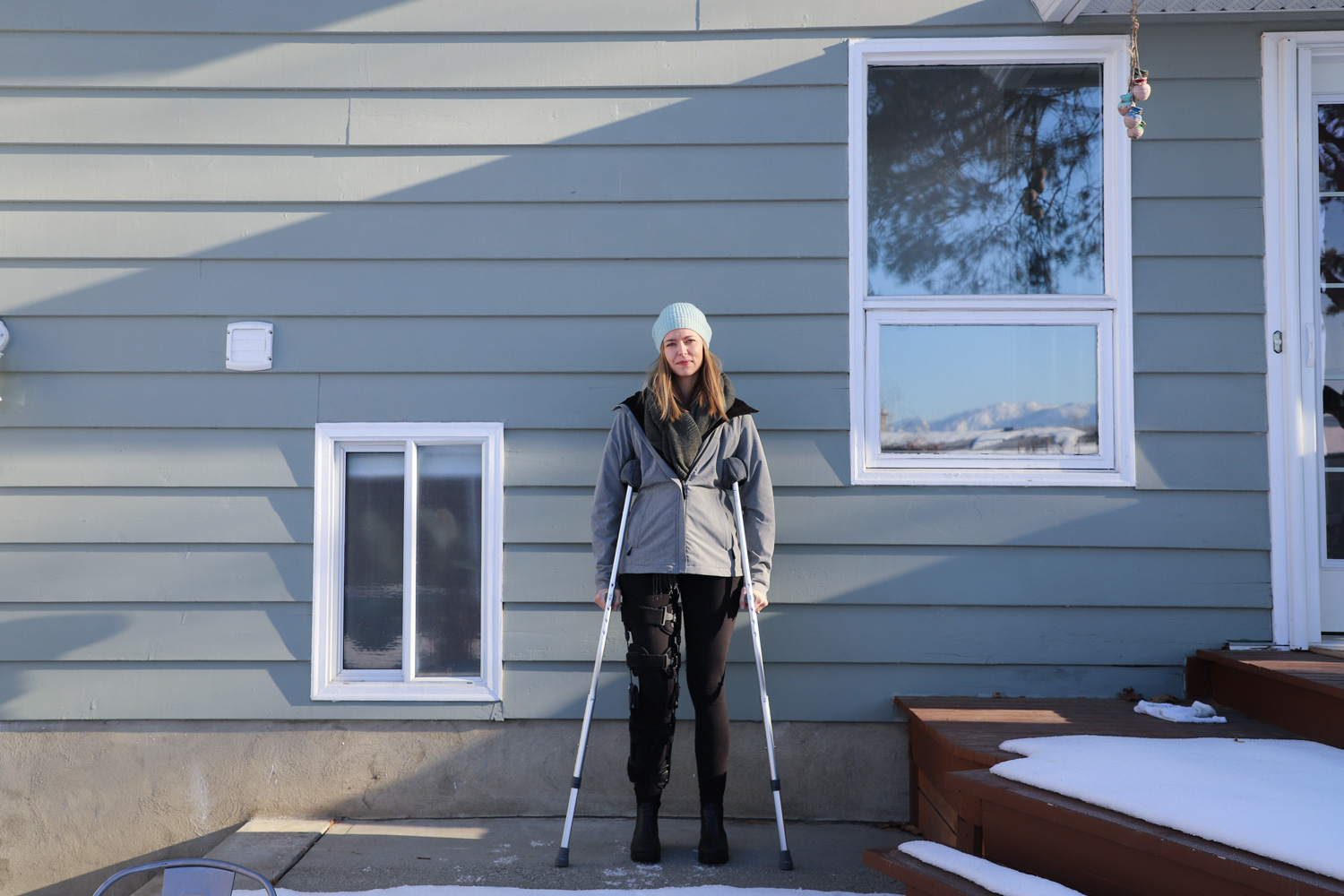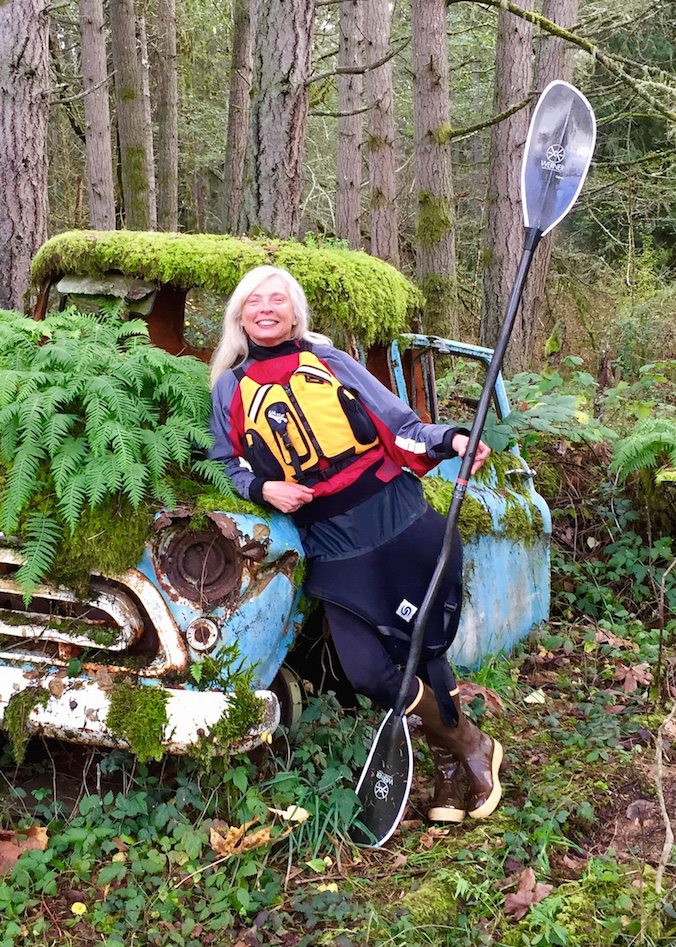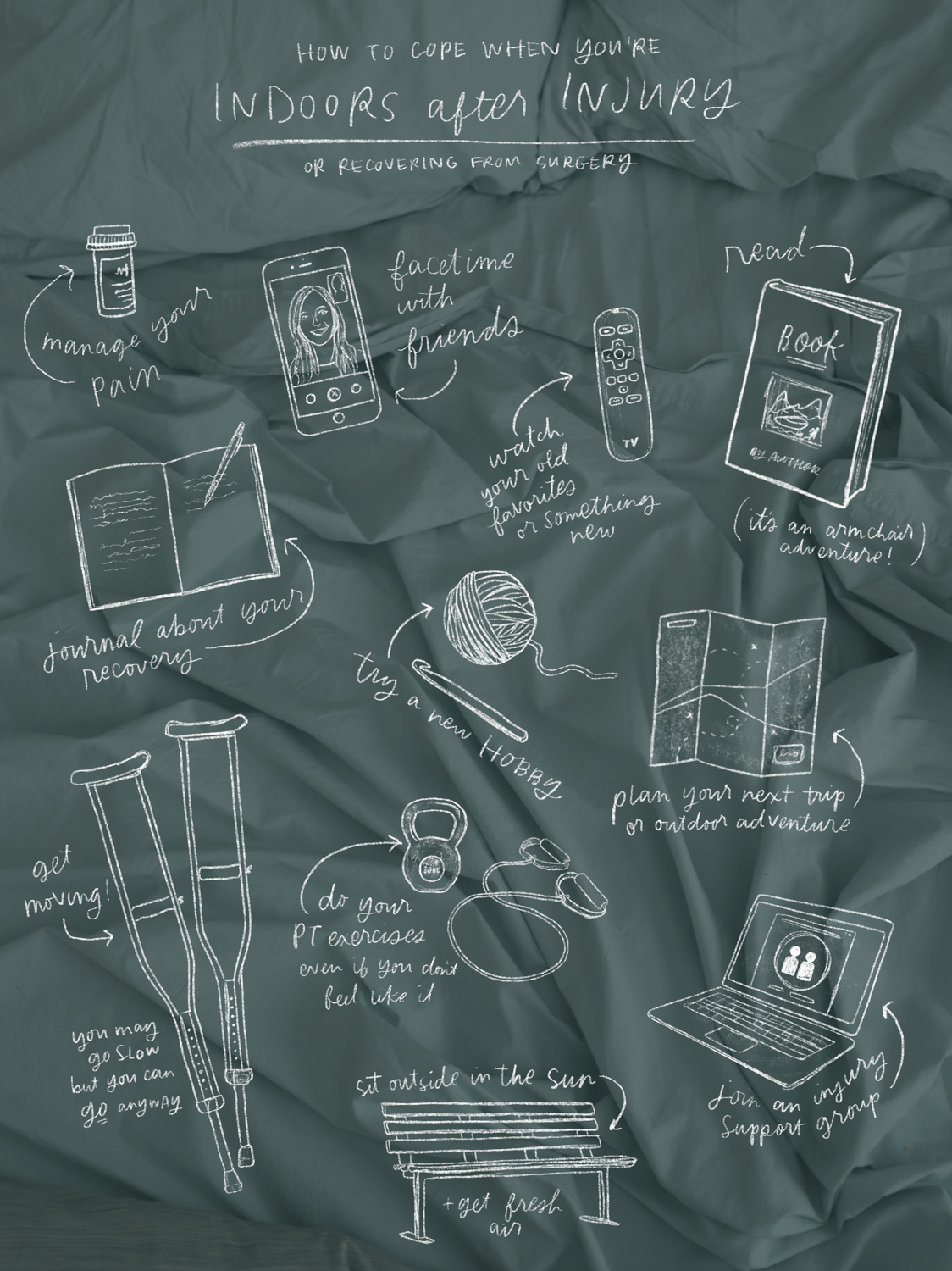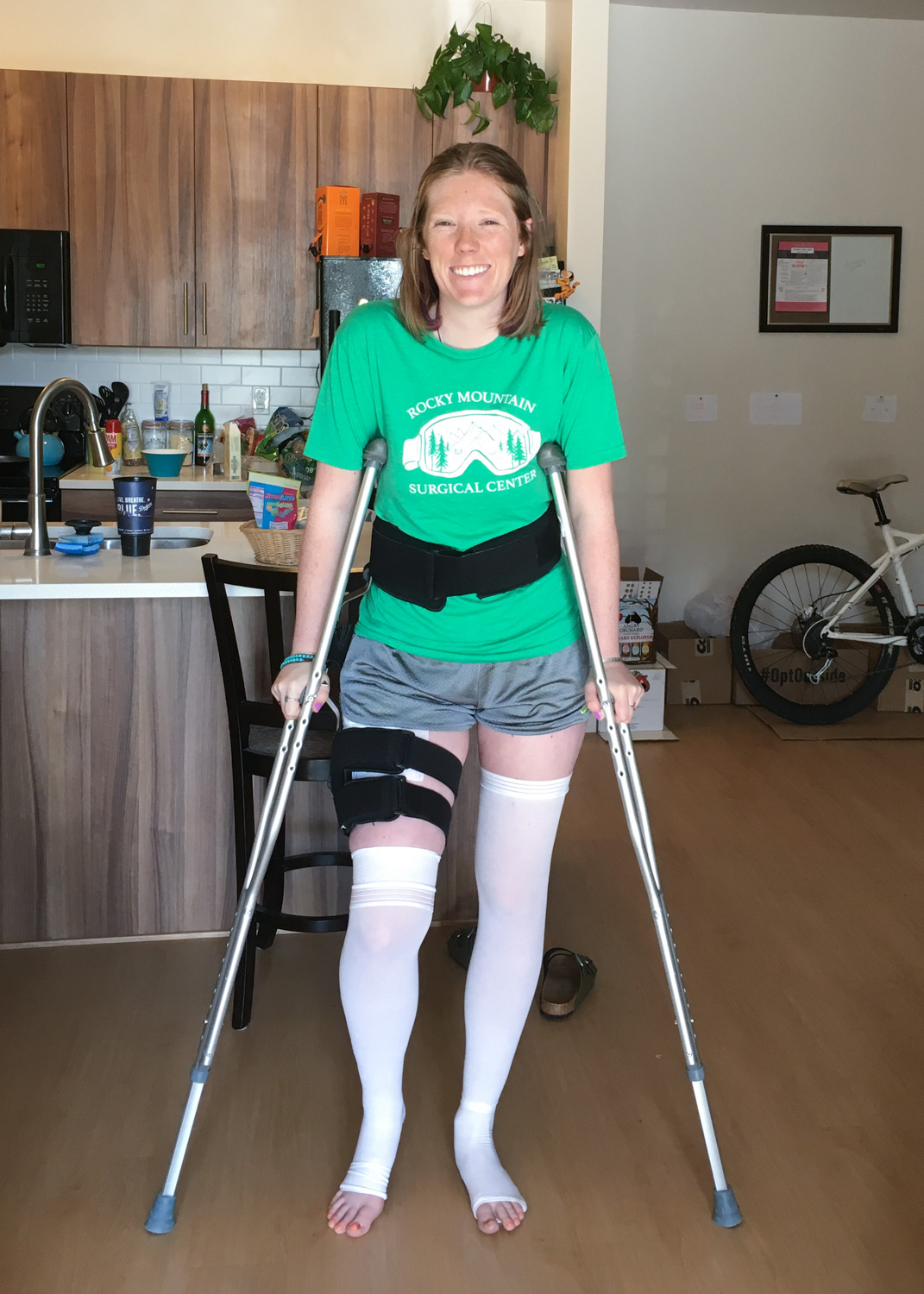How to Cope When You’re Recovering Indoors

Tips From Women Who’ve Been There, Too
By Hailey Hirst
Being injured, or otherwise sidelined by illness or surgery, is difficult for many reasons. Besides physical discomfort and limitations, one of the most challenging parts is the feeling of isolation that comes from being stuck indoors.
After my knee surgery three months ago, I struggled with feeling stuck—both within familiar walls and inside a body that wasn’t working the way it used to. And even though I felt alone during those difficult first weeks when I didn’t leave my house and barely left the couch, I knew I was not alone in this struggle.
In preparation for this week’s podcast episode (EP100: Injured and Indoors) I reached out and asked for input from our She Explores Podcast Facebook Group and received tips from five other injury-experienced women on how to cope with the physical and mental struggle of recovering indoors.
The women, their injuries, and their best advice:
Jaime Purinton
Jamie fell while hiking and shattered all three ankle bones and dislocated the joint. She had two surgeries, spent two months in a wheel chair, and two months on crutches. Recovery lasted over a year.
Jaime’s advice:
-

Understand you will get through it and you will have a deeper perspective of yourself because of your recovery. Even if time feels as if it is dragging, it will go by so fast.
- Rest and rest some more. Take those naps you’ve wanted to take but felt too busy for. Healing any traumatic injury takes a toll on your body. Your body will need lots of rest to be able to heal.
- Take up meditation. This helped me tremendously with the pain—emotional and physical. This was the catalyst for some major positive changes in me. If you don’t know where to start, check out the insight timer app.
- Ask for help. This was extremely hard for me to do as I always was the helper. I was amazed at how many people showed up day after day with dinners, groceries, and helped with house chores or just to cheer me up.
- Find an online support group. I joined a Facebook group specific to broken ankles/legs. The support and information the group provided was priceless. Plus it gave me hope that I would get through it.
- Write a journal/blog. I started a recovery blog while healing and writing out how I was feeling and what I was going through was a cleansing experience.
See more from Jaime on Instagram and her business page, hikeitoffclothing.com.
Susan Conrad
Susan had an emergency appendectomy surgery. She couldn’t lift anything heavier than a pencil for six weeks, which kept her from her favorite sport: kayaking.

Susan with her paddle — photo by Sean Griffin
Susan’s advice:
- Make a storyboard of your favorite adventures. When I’m sidelined, looking at these images from my favorite paddling adventures inspires me and reminds me that I’ll be back in the cockpit soon.
- Stick to your healing goals. I subscribe to a daily inspirational email called Daily OM. Whenever I’m feeling antsy because I can’t get out on the water for a paddle, I do a quick search in my Daily Om archives for “patience.” Reviewing all the advice on how to stay the course helps center and realign me with my healing goals.
- Visualize your body healing. I engaged all my senses, feeling, smelling, seeing, tasting, hearing: what it would be like to slither my hips back into my long skinny kayak.
- Have long phone calls to close friends.
- MOVE every day, if only in small ways.
- Constantly remind yourself to enjoy the downtime, because it won’t last long!
See more from Susan on Instagram, Twitter, and her author website, susanmarieconrad.com.
Sayre Posey
Sayre fractured her seismic bone (foot) with non-union break. She spent months in a boot and was sidelined from rock climbing, hiking, and trail running for the better part of a year.
Sayre’s advice:

- SWIM if you can. It was the one exercise I was permitted to do while recovering. It improves your endurance, feels great, and you can share your injury story with others at the pool (and maybe hear theirs!)
- If you can’t go outside, read about the outdoors. Some awesome books I read during my recovery were Thru Hiking Will Break Your Heart by Carrot Quinn, A Walk in the Woods by Bill Bryson, Called Again by Jennifer Phar Davis, and Alone on the Wall by Alex Honnold. It gave me a chance to look forward to my own adventures once I recovered, and briefly enter nature from my living room.
- Find physical therapy or strength-building exercises to do in your downtime.
- DO NOT Google every single story on the internet about someone experiencing the same injury. It is a mind-numbing and repetitive circle of gloom.
- Be social as much as possible. As hard as it might be to be social during your recovery time, it’s helpful to find other things to do together with friends or family. The worst thing I did was lay in my bed on the weekends and feel sorry for myself.
- And finally, catch up on every episode of She Explores 😉
See more from Sayre on Instagram.
Amanda Gates
Amanda underwent two hip surgeries to repair labral tears. She had to take four months off work, couldn’t sit upright, and was on crutches for a total of 14 weeks and in an uncomfortable brace 24/7.
Amanda’s advice:
- Listen to a favorite podcast and watch a favorite TV series.
- Make something for someone else. I made friendship bracelets, trying new patterns I found on the internet that seemed difficult. When they were finished I’d write a heartfelt letter to a friend and send the bracelet with it. This helped me feel gratitude during a low point in my life. It made my friends happy to receive something unexpectedly, and it made my heart sing realizing how lucky I was to be able to write such beautiful things about the people in my life.
See more from Amanda on Instagram.
Hannah Carey
Concussion. Hannah received two concussions four months apart while playing for her college rugby team. After the second one, she wasn’t able to run or do strenuous exercise for a year due to dizziness and headaches.
- Try to remind yourself that this period is temporary. You will recovery, you will run or hike or bike or do any activity again that you love, it will just take time.
- Stay positive. Think about all of the health you do have and focus on what you can do, rather than cannot. Can you still think clearly? Do you still have the mobility of your hands, arms, or legs? Are you able to live without pain most of the time? Reminding myself to be grateful and have perspective really helped.
- If you can afford it, try connecting with a healthcare provider who specializes in your illness or injury so you can expedite recovery as much as possible.
- Spend time outside if you can, even if it’s just sitting on your front steps or a park bench! The sun and wind on your face can work wonders on your mental health.
See more from Hannah on Facebook.
Since we’ve covered a lot with these five perspectives, I’m offering a condensation of these (and my personal) tips in the form of an illustration. It’s important to 1) manage pain 2) move your body 3) connect with other people 4) look ahead, and 5) have various kinds of entertainment/stimulation you can switch between.

Tune into this week’s episode of the She Explores Podcast for a more intimate exploration of the recovery process.
Hailey Hirst is She Explores’ Digital Content Editor and a multi-passionate creative who thrives on the often-overlooked details. She lives in Kelowna, British Columbia. Find her on Instagram.
Editor’s Note: Big thanks to Jaime Purinton, Susan Conrad, Sayre Posey, Jessica Gonzales, Amanda Gates, and Hannah Carey for their thoughtful contributions to this article.

So nice to find people online thst have also been stuck in their homes due to surgery. On August 12th I had a meniscus root tear repair surgery no bearing weight for 6 weeks. Left knee. Been out to go to therapy for stretches. Next week doctor appointment for stitches. So hard get out front door we have 3 steps. My husband helps me down and going up I slide on my rear. Did any of you ladies have someone come in and help you. It’s miserable. I write children’s books and working on an adult mystery book so I keep busyi in that area.
Great advice! Having a healthy mindset is crucial to recovering and getting back on track. Thank you for posting!